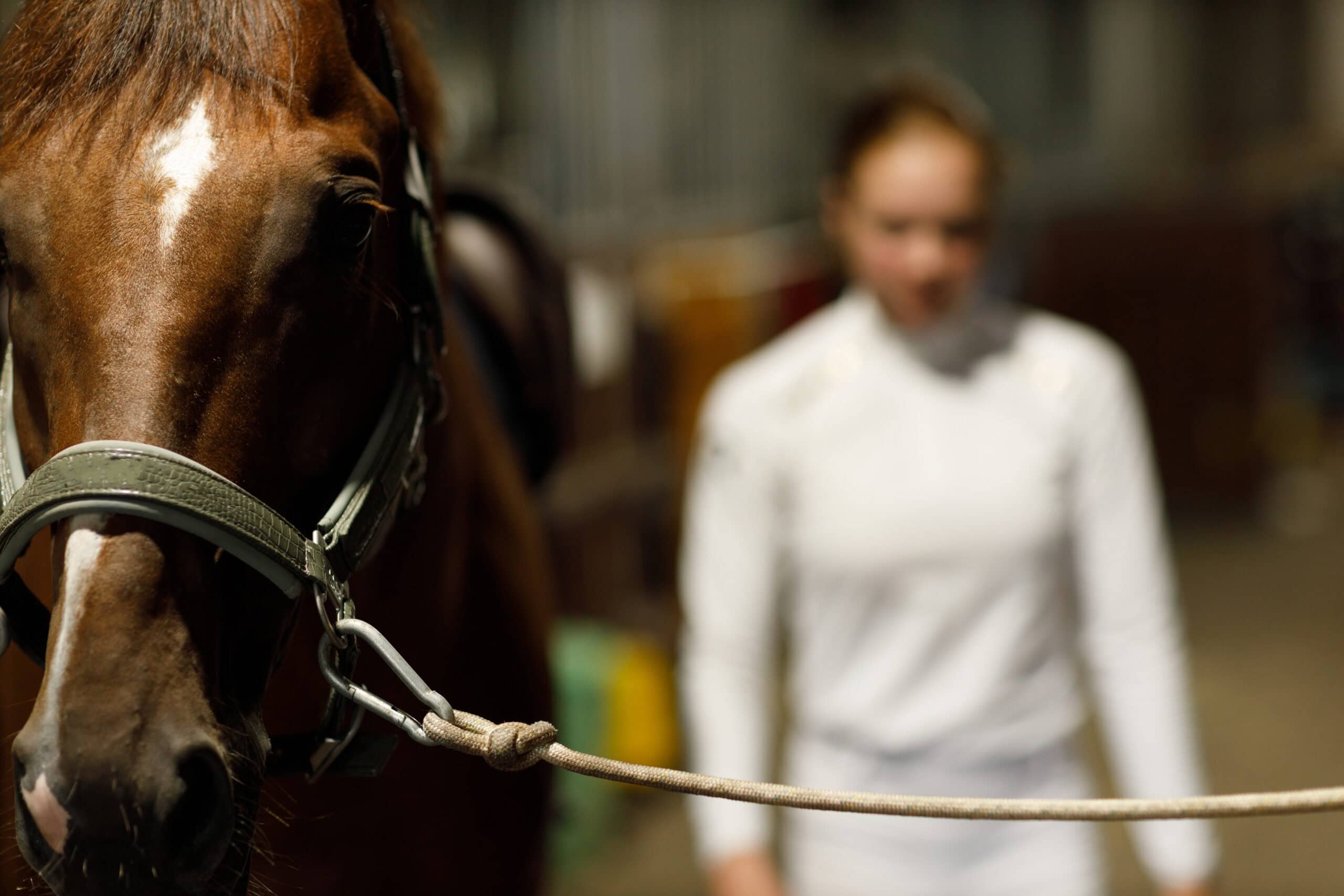Horse Boarding Rights and Responsibilities
The terms of horse boarding relationships are governed solely by contract (written or verbal).


By Rachel Kosmal McCart
At Equine Legal Solutions, we receive a lot of calls from horse and boarding stable owners who are unhappy with a situation and want to know their legal rights. In the four states where we practice — California, New York, Oregon and Washington — there are no laws governing horse boarding, other than animal cruelty statutes and local zoning regulations governing use of the property. Landlord/tenant law generally does not apply to horse boarding relationships unless the boarder lives on the stable property. Therefore, in general, the terms of horse boarding relationships are governed solely by contract (written or verbal).
What are the minimum accommodations a boarding stable is legally required to provide?
Unless the boarding contract says otherwise, a boarding stable is only required to provide the absolute minimum level of care — i.e., not violate state animal cruelty laws. State law generally requires providing access to potable water. Beyond that, requirements vary but are usually minimal. For example, depending on the state and local laws, a boarding stable might not be legally required to provide shelter. Or, there might be no restriction on the number of horses a boarding facility can keep on a particular piece of property. So, having a written horse boarding contract that spells out all the important terms and conditions is essential for both boarding stable and boarder! ELS offers a downloadable horse boarding contract and forms package.
How much notice is a boarder required to give a boarding stable before moving out?
Boarding contracts usually say how much notice a boarder is required to give before leaving, and often, it is 30 days. However, if there is no boarding contract, or the boarding contract does not specify the required notice, the boarder can give as little as same-day notice.
Does a boarder have to give a boarding stable written notice before moving out?
Boarding contracts often require a boarder to give a boarding stable written notice before leaving. But if the boarding contract doesn’t say what kind of notice is required, or there is no boarding contract, a boarder can give practically any type of notice, so long as the boarding stable receives it.
When can a boarding stable terminate a boarding contract?
Typically, a boarding stable can terminate a boarding relationship for any or no reason, unless the boarding contract says otherwise (which is rare). The boarding stable usually does not need to provide any reasons to the boarder. Landlord/tenant law generally doesn’t apply to horse boarding relationships unless the boarder lives on the stable grounds. Here are some commons reasons boarding stables “evict” boarders:
- Boarder does not pay on time
- Boarder does not get along with other boarders
- Boarder does not get along with barn owners and/or staff
- Boarder is too demanding (high maintenance)
- Boarder does not follow barn rules
- Boarder rides and/or handles their horse in an unsafe manner
- Boarder’s horse is dangerous and/or destructive
- Boarder is not caring for their horse properly, particularly at self-care or partial-care boarding facilities
How much notice is required for a boarding stable to “evict” a boarder?
Unless the boarding contract says the boarding stable must give X days advance notice to the boarder, the stable owner can terminate the boarding relationship without giving advance notice. Again, landlord/tenant law generally doesn’t apply unless the boarder lives on the stable property.
Does a boarding stable have to give a boarder written notice?
Typically, horse boarding contracts will specify what type of notice a boarding stable is required to give a boarder to terminate the boarding contract. If the boarding contract doesn’t say what type of notice is required or there is no boarding contract, the boarding stable can deliver notice that it is terminating the boarding relationship via practically any means, so long as the boarder receives it. ELS offers a selection of downloadable boarding termination notice forms for boarding stables.
How much can a boarding stable raise the board, and how often?
Unless the boarding contract says otherwise, the boarding stable can raise the board as much as it wants, as often as it wants. The only true limit is what boarders are willing to pay.
What can a boarder do if a boarding stable raises the board?
When a boarding stable announces a rate increase, boarders have two choices: Pay or leave. And if a boarder chooses to leave, they must provide the boarding stable with the notice specified in the boarding contract (if any).
Can a boarding stable make a boarder move out?
Yes. So long as a boarding stable abides by the terms of the boarding contract (if there is one), it can require any boarder to leave for practically any reason or even no reason.
None of the following factors matter:
- Boarder has been at the facility for a long time (even decades)
- Boarder doesn’t want to move
- Boarder has consistently paid board on time
- Boarder never signed a boarding contract
- Moving to another boarding facility would be inconvenient, expensive and/or stressful
- There isn’t another boarding facility that meets the boarder’s needs
- Boarder doesn’t have transportation for their horse
- Boarder’s trainer and/or friends are at the facility
- Boarder’s horse is elderly, suffers from health issues or is otherwise difficult to transport
What can a boarding stable do if a boarder refuses to move out?
At ELS, we receive frequent calls from boarding stables that gave notice to boarders, but the boarders refuse to leave or have stayed on past the termination date. The boarding stable does have legal options, and again, landlord/tenant law doesn’t apply unless the boarder lives on the stable property. Because facts and circumstances vary greatly depending on the situation, a boarding stable facing this problem (or concerned it will) should consult with an equine attorney to develop a plan of action.
Boarding stables can make the termination process much easier by having a boarding contract that clearly states what will happen if a boarder refuses to move out after being served notice. ELS offers a downloadable horse boarding contract and forms package that addresses what a boarding stable can do with horses and equipment belonging to a boarder who has not removed them by the move-out deadline.
How much and what kind of hay or feed is a boarding stable required to provide?
Unless the boarding contract says otherwise, a boarding stable has broad discretion to provide hay and/or feed in the types and amounts it thinks suitable and at the time(s) of day it chooses. In self- and partial-care boarding arrangements, boarders are typically responsible for providing all hay and feed.
What if a boarder is unhappy with the type or amount of hay and/or feed a boarding stable is feeding?
Bottom line, the unhappy boarder has two options: (1) Negotiate with the boarding stable to feed more and/or different hay or feed (and be prepared to pay extra for it), or (2) move to another boarding facility whose feeding program better suits the boarder’s needs. This is true even if:
- Boarder’s horse is losing weight
- The hay is not of good quality (so long as it is not moldy or contaminated)
- Boarder’s horse is allergic
- Other horses are stealing boarder’s horse’s food
How much and what kind of bedding is a boarding stable required to provide?
Unless the boarding contract says otherwise, a boarding stable has broad discretion to provide bedding in the types and amounts it thinks suitable, so long as the bedding is not poisonous to horses (such as wood products containing black walnut). In self-care boarding arrangements, boarders are typically responsible for providing bedding, and in partial-care boarding arrangements, boarders might be responsible for providing bedding.
What if the boarder is unhappy with the type or amount of bedding the boarding stable provides?
The unhappy boarder has two basic options: (1) Negotiate with the boarding stable to provide more and/or different bedding (and be prepared to pay extra for it), or (2) move to another boarding facility whose program better suits the boarder’s needs. This is true even if:
- Boarder’s horse is getting hock sores from insufficient bedding
- Bedding is dusty
- Boarder’s horse is allergic
How well and how often is a boarding stable required to clean stalls and/or paddocks? What about pastures?
Unless the boarding contract says otherwise, a boarding stable has broad discretion to clean stalls, paddocks and pastures at the days and times it sees fit and in the manner it sees fit, so long as the conditions do not present an obvious and serious health hazard (such as hock-deep manure). Many boarding facilities do not remove manure or otherwise clean pastures, and some boarding facilities do not clean on a particular day of the week (typically Sunday or Monday). In self- and partial-care boarding arrangements, boarders are typically responsible for cleaning their own stalls and paddocks.
What if a boarder is unhappy with the timing, frequency or thoroughness of a boarding stable’s cleaning program?
The unhappy boarder has two basic options: (1) Negotiate with the boarding stable to provide a different cleaning program for the enclosure(s) where the boarder’s horse is kept (and be prepared to pay extra for it), or (2) move to another boarding facility whose cleaning program better suits the boarder’s needs. This is true even if:
- The parasite load in the enclosure is high
- The conditions are creating or exacerbating a fly problem
What can boarding stables and boarders do to help ensure they are good matches for each other?
Both boarding stables and boarders should approach boarding relationships as though they were landlords and tenants, carefully considering the boarder’s budget, needs and expectations and comparing that to the stable’s amenities and price point. In addition, both should listen to their gut instincts and avoid entering into a boarding relationship that “just doesn’t feel right.”
A boarding stable can avoid taking in a boarder who has a history of issues at other boarding facilities by checking references — not just the boarder’s current facility (which might be desperate to have the boarder move on) but also the boarder’s previous facility. ELS offers a downloadable horse boarding contract and forms package that includes a boarding application asking about other facilities where the potential boarder has kept their horse.
A boarder can talk to current and former boarders to get a feel for the facility to see if it will meet their needs and provide an environment in which they and their horse will fit in well. And, if they or their horse will have special requirements, listing them in the boarding application will ensure these are addressed prior to moving in.
Share this article

Written by: Rachel Kosmal McCart
Rachel Kosmal McCart is a lifelong horsewoman and the founder of Equine Legal Solutions, PC, an equine law firm based in the Portland, Oregon area. Rachel is a member of the New York, California, Oregon and Washington State bars and is admitted to practice before the U.S. District Court for the District of Oregon and the U.S. District Court for the Central District of California. Rachel currently competes in three-day eventing.
Legal Counsel With Horse Sense™
Equine Legal Solutions provides legal services for equine matters in the states of California, New York, Oregon, and Washington.








